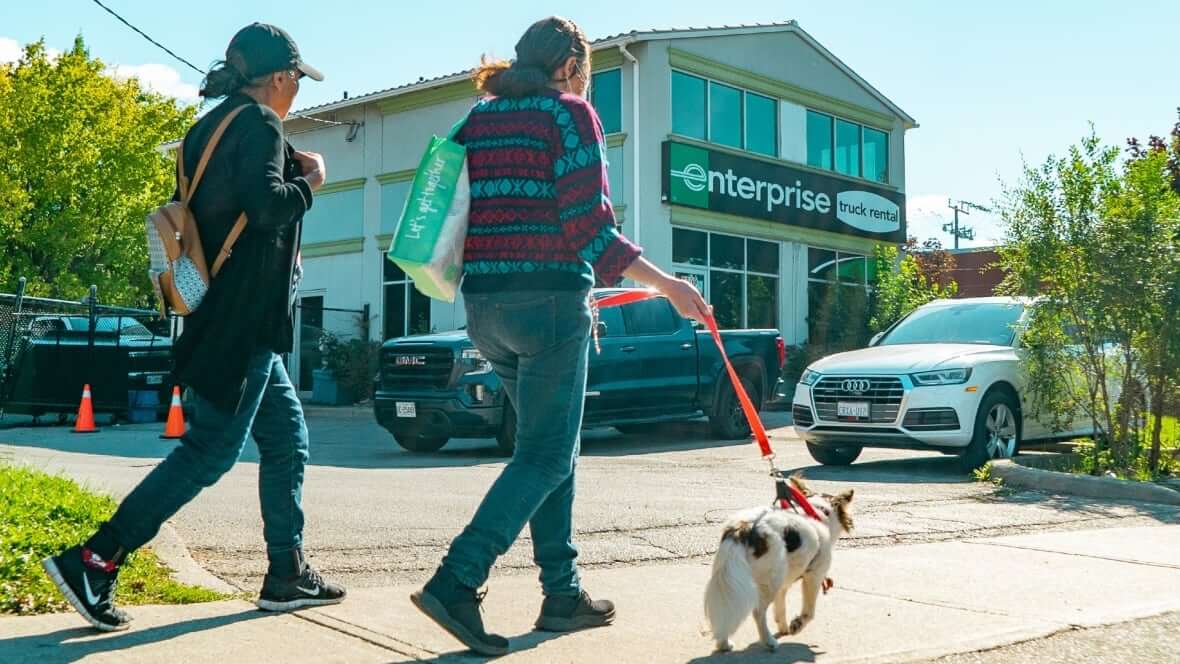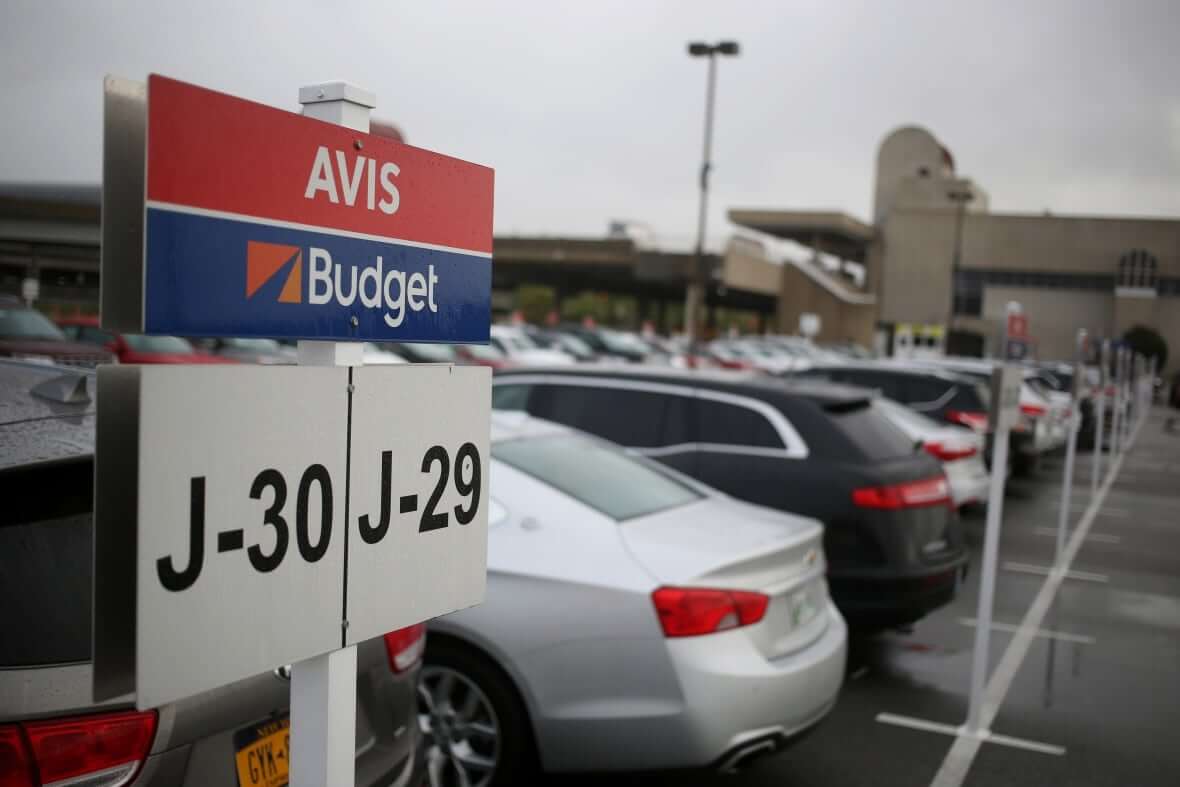Enterprise charges customer more than $3,300 for damage incurred after truck returned

Samuel Wardlaw expected to pay $200 for his truck rental. Instead, Enterprise Rent-A-Car added more than $3,300 to his bill — for damage that occurred after he dropped it off.
He’d only used the truck for five hours, to move some belongings to his new apartment.
But a week later, an unexpected email from the rental giant said he was responsible for damage that occurred on the Enterprise lot after hours.
The email didn’t explain what had happened or why he was responsible — but it struck fear in Wardlaw, 29, a delivery driver for a lumber company.
“I was anxious about what the price was going to be,” he said. “So to see over $3,300 in damage? I was totally shocked.”
Enterprise said later that, after Wardlaw parked the truck and put the keys in a secure drop box, as instructed by an employee, someone stole its catalytic converter, a part of the exhaust system that contains valuable metals.
Enterprise pointed to a clause on page 7 of its rental contract that says drivers who drop off a vehicle after hours are responsible for any damage or theft until it’s checked in by an employee.
“It’s their truck, their lot, their catalytic converter. Everything about it is within Enterprise’s control,” said Wardlaw. “For them to say it’s my liability is pretty ridiculous.”
After Go Public got involved, Enterprise said in an email it had “decided not to pursue the claim.”
The company did not explain why and said no one was available for an interview.
Go Public has checked the terms and conditions for the three major companies that account for an estimated 95 per cent of all car rentals in Canada: Enterprise (which owns National and Alamo), Avis (which owns Budget) and Hertz (which owns Dollar and Thrifty).
All the contracts contain similar clauses, claiming drivers are responsible for any damage or theft from the time they drop off a vehicle until it is checked back in.

A consumer advocate and lawyer says Enterprise and other car rental giants give the impression there’s no downside to dropping off a vehicle after hours.
“We’ve all been there — the car company says, ‘No problem, stick the keys through the slot in the door,'” said Jennifer Marston, who works with the free legal clinic Pro Bono Ontario.
“But how many times do they say to you, ‘If anything happens when the car is parked on the lot, you’re responsible’? That’s never happened to me.”
‘Just put the keys through the drop off slot’
Wardlaw says when he arrived to pick up the truck, there was little discussion about the terms and conditions in the 30-page (English and French) contract.
“They told me that since they were going to be closed at 12 o’clock that day and I would be returning at around 1 p.m., to just put the keys through the drop off slot when I returned the vehicle,” he said.
Marston says big car rental outfits can’t hide behind lengthy contracts they know most people won’t read and may not understand when they contain ambiguous or unusual terms.


“They wrote it. They had the opportunity to put more effort into making it clear and they didn’t,” she said.
She says legal precedent exists due to an Ontario case which found Tilden Rent-A-Car was required to bring unexpected terms to the attention of the consumer if it wants them to be enforceable.
“When there’s an onerous term in the contract, a heavy term that puts a big burden on someone, if it’s buried in the fine print, then the company in a consumer transaction like this has the responsibility to bring that to the consumer’s attention,” said Marston.
The companies also have to meet a standard of proof when holding customers responsible for damage, said Marston.
When Enterprise told Wardlaw a thief had stolen that catalytic converter, it sent photographs of the damage, but they weren’t time-stamped.
“We don’t know when those photos were taken,” said Marston.
“Maybe they were taken a week later. The burden is on the company to prove that.”
She says people caught in a dispute need to know one thing — the rental company isn’t the judge.
“They will send you a letter saying you’ve caused this damage, you owe this amount of money. But they’re actually not the ones who get to decide that,” said Marston.
“That’s just their position as one of the parties to a legal claim. And you have the opportunity to respond,” she said, with the understanding that the matter might end with a collection agency or small claims court.
Go Public has learned that the same Enterprise location in north Toronto had half a dozen catalytic converters worth $24,000 stolen from its trucks shortly after Wardlaw’s incident.
The company declined to say what it is doing to prevent further thefts and damage.
Marston says the companies should ensure their vehicles are being stored under safe conditions.
“The rental company could secure the perimeter. They could install security cameras. They can install anti-theft devices on vehicles,” she said.
“These options aren’t available to the consumers, so why should the consumer bear the loss?”
‘This is absolute BS’
Stuti Narula of Toronto says an Enterprise employee also told her to drop off the keys when she returned a car after hours, to a location in the city’s north end last December.
The next day, an Enterprise employee called to say she was responsible for a scratch on its passenger door — and owed $1,000.
Narula says the car was in perfect condition when she returned it, but — as with Wardlaw — an employee said she was liable for any damages incurred before it was checked back in and that the matter would be sent to a collection agency if she didn’t pay up.
“This is absolute BS,” said Narula. “If I have to be held liable for any damages to the car, I might as well keep it in my careful custody until the office opens the next day.”
She says the drop-off location had closed-circuit cameras, but she was told she couldn’t see footage.
Narula also says she was told the damage was discovered after an employee drove the car to a car wash — and she questioned whether that’s when the damage occurred.
“I’m entitled to know what investigation Enterprise carried out at its end before slamming the damage cost on me,” Narula wrote in an email to the car rental giant.
After fighting Enterprise for several months, Narula reluctantly asked her car insurance company to submit a payment, but she’s sworn off ever renting from Enterprise again.
Enterprise wrote in an email to Go Public that allowing customers to return vehicles after hours is a “convenience” and that “it is important to understand that the rental transaction is not complete until the vehicle has been inspected.”
Wardlaw says he’s relieved he’s no longer expected to pay his damage bill, but says Enterprise has lost him as a customer, too.
“Basically, from the moment I called them, they were arguing with me. I didn’t feel that there was any interest in resolution — other than to have me pay the full amount.”
Protect yourself ‘after hours’
- Ideally, return your vehicle during operating hours and have an agent check it over and sign off on rental.
- If you must drop off the vehicle after hours, note whether there are security cameras on the lot and try to park within view.
- Set your smartphone to add a date and time stamp to photos and take pictures of the sides, front, back and roof of vehicle and — if possible — the underside, wheel wells, interior and trunk.
- Take a photo of the mileage on the odometer.
- Hold onto photos for at least six months.








Redes Sociais - Comentários